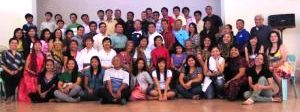Dear Brothers and Sisters in Christ,
 In the Peanuts cartoon strip below, Lucy is like so many people today who are stressed out about what they see happening in the world. Linus reassures her with some sound, Bible-based theology.
In the Peanuts cartoon strip below, Lucy is like so many people today who are stressed out about what they see happening in the world. Linus reassures her with some sound, Bible-based theology.
Sound theology is important, for unsound theology distorts our understanding of God and our relationship with him. However, it’s important to note that we are not saved by theology. And so we need to keep it in perspective.

Christianity has never been theologically or doctrinally perfect. We often hear preachers urging people to “get back to the faith once delivered.” By this, they usually mean the early apostolic church, which they assume had a complete and uncorrupted understanding of the faith. However, those apostolic churches were not perfect. They too had to grow in their understanding of what was “sound doctrine.”
In fact, much of the New Testament is polemic – meaning that it was written to correct various wrong ideas. In Corinth, for example, some Christians were tolerating incest, suing one another in court, offending each other by their understanding of what they were permitted to eat and becoming drunk at the Lord’s Supper. Some thought they should be celibate even if married and others thought they should divorce their non-Christian spouses. Paul had to correct these ideas, and history tells us that he had only limited success. But the people were Christian despite their lack of complete doctrinal understanding.
There are many examples of the disciples failing to understand Jesus, even when he was with them. For example, after Jesus miraculously fed thousands of people, he and the disciples got into a boat and Jesus warned them, “Watch out for the yeast of the Pharisees and that of Herod” (Mark 8:14). The disciples concluded that Jesus meant that, since they hadn’t brought any bread they would have to buy some on the other shore; moreover, they shouldn’t buy any bread from a Pharisee or Herodian because something was incorrect about the yeast they used.
Why didn’t they just ask Jesus what he meant? Perhaps because they were afraid of looking foolish (that happens today, too!). Jesus chided them for not understanding something that they should have been able to grasp. The disciples didn’t need to worry about bread or yeast. Jesus had just shown that he could make bread miraculously. They could remember facts (verses 19-20), but they didn’t always draw right conclusions from those facts. The miracle of the loaves was not just a way to save money — it also had a much deeper meaning that the disciples had failed to understand (Mark 6:52). It figuratively symbolized the fact that Jesus is our source of life.
I am encouraged to know that Jesus’ own disciples frequently didn’t fully comprehend what he was doing. Nevertheless, Jesus still co-ministered with them, as he does with us. It demonstrates that any “success” we have is the result of God’s guidance, not our human ability to figure things out exactly.
Those first disciples were thrown into confusion by Jesus’ death even though he explained it to them more than once. But, like us, they could only absorb so much at a time. If you follow the flow of the conversation at the Last Supper, you can see by their questions and frequent attempts to change the subject that the disciples did not understand what was going on. So Jesus told them, “I have much more to say to you, more than you can now bear. But when he, the Spirit of truth, comes, he will guide you into all the truth” (John 16:12-13).
After his resurrection, Jesus appeared to his disciples and instructed them for 40 days, after which he ascended to heaven. While with them, he said, “Do not leave Jerusalem, but wait for the gift my Father promised, which you have heard me speak about. For John baptized with water, but in a few days you will be baptized with the Holy Spirit” (Acts 1:4-5).
Jesus’ words were fulfilled on the day of Pentecost. And as we read in Acts 2:4, the disciples were filled with the Holy Spirit and through his guidance, what had been isolated facts and an unsound theology came together in a new and exciting way. The apostle Peter preached his first public sermon, urging his audience to repent, to believe in Jesus Christ as their Messiah and to receive the gift of the Holy Spirit (verse 38). On that day, some 3,000 people were baptized and became the people of God (verse 41). The church had been born.
From that day on, the Holy Spirit has continued to guide the church into “all the truth,” helping her to “prove the world to be in the wrong about sin and righteousness and judgment” (John 16:9). The New Testament writers, led by the Holy Spirit, showed those first Christians how to live godly lives in the turbulent environment of the first century. He is doing the same with us today, as we struggle to “get it right” while facing the complex and controversial challenges of our time.
We need to remember then, that the ultimate object of our faith and the only object of our worship is our Triune God, not our theological statements. We want to tune our theological understandings as best we can to do nothing less and nothing more than serve our faith in and worship of the Father, Son and Spirit. By the Spirit and the Word our theological understandings can be continually sanctified. This coming week on Pentecost Sunday we celebrate the descent of the Spirit that gave birth to the church. While not yet perfect, the children of God have been given the good and perfect gift of the Spirit, who will in the end enable all of us to share in Jesus’ own perfection!
With love, in Christ’s service,
Joseph Tkach



